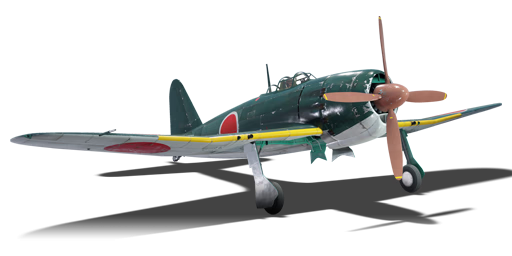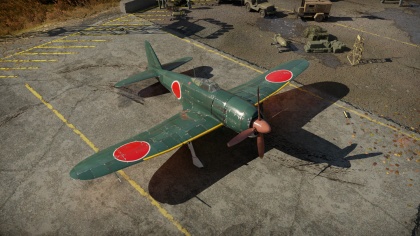Difference between revisions of "A7M2"
(Edits.) |
Inceptor57 (talk | contribs) m |
||
| Line 80: | Line 80: | ||
* 70 mm bulletproof glass in front of the pilot | * 70 mm bulletproof glass in front of the pilot | ||
| − | * 13 mm steel plate behind the pilot seat | + | * 13 mm steel plate behind the pilot seat |
While being slightly more durable than its older brother, the Reppu is still very vulnerable to any kind of battle damage. Anything with greater than .50 calibre weapons will be able to take off a wing or worse. The wingspan has also increased significantly to keep the manoeuvrability of the Zero while supporting increased weight added from the guns, engine and other updates. A downside is that this makes the wings easier to hit. However, The manoeuvrability of the Reppu allows this aircraft to avoid most damage if you can keep turning. | While being slightly more durable than its older brother, the Reppu is still very vulnerable to any kind of battle damage. Anything with greater than .50 calibre weapons will be able to take off a wing or worse. The wingspan has also increased significantly to keep the manoeuvrability of the Zero while supporting increased weight added from the guns, engine and other updates. A downside is that this makes the wings easier to hit. However, The manoeuvrability of the Reppu allows this aircraft to avoid most damage if you can keep turning. | ||
Revision as of 05:43, 7 April 2019
Contents
| This page is about the Japanese fighter A7M2. For premium version, see A7M1 (NK9H). |
Description
The A7M2 Reppu is a Rank IV Japanese fighter
with a battle rating of 5.0 (AB), 5.3 (RB), and 4.7 (SB). This aircraft was introduced in Update 1.55 "Royal Armour".
General info
Flight Performance
The A7M Reppu was designed to be an improved version of the famed A6M Zero fighter, and as such, retains some of its legendary older brother's characteristics. The Reppu is an overall smooth operator at most altitudes thanks to its decent acceleration, vastly improved speed and amazing manoeuvrability. While less manoeuvrable than the Zero, it will still outmanoeuvre most opponents with flaps deployed, so players who liked the Zero will feel right at home. The most noteworthy change is the replacement of the underpowered Nakajima Sakae Radial engine with a significantly more powerful Mitsubishi Ha-43 Radial. This new engine propels the Reppu to higher speeds previously unobtainable by the Zero and turns this aircraft from a nuisance to a universally feared opponent.
| Characteristics | |||||||
|---|---|---|---|---|---|---|---|
| Stock | |||||||
| Max Speed (km/h at 5,660 m) |
Max altitude (meters) |
Turn time (seconds) |
Rate of climb (meters/second) |
Take-off run (meters) | |||
| AB | RB | AB | RB | AB | RB | ||
| 608 | 589 | 11000 | 19.3 | 20.2 | 15.1 | 15.1 | 250 |
| Upgraded | |||||||
| Max Speed (km/h at 5,660 m) |
Max altitude (meters) | Turn time (seconds) | Rate of climb (meters/second) |
Take-off run (meters) | |||
| AB | RB | AB | RB | AB | RB | ||
| 655 | 629 | 11000 | 18.8 | 19 | 22.8 | 18.5 | 250 |
Details
| Limits | ||||
|---|---|---|---|---|
| Wing-break speed (km/h) |
Gear limit (km/h) |
Combat flap (km/h) |
Max Static G | |
| + | - | |||
| 826 | 310 | ~?? | ~? | |
Survivability and armour
- 70 mm bulletproof glass in front of the pilot
- 13 mm steel plate behind the pilot seat
While being slightly more durable than its older brother, the Reppu is still very vulnerable to any kind of battle damage. Anything with greater than .50 calibre weapons will be able to take off a wing or worse. The wingspan has also increased significantly to keep the manoeuvrability of the Zero while supporting increased weight added from the guns, engine and other updates. A downside is that this makes the wings easier to hit. However, The manoeuvrability of the Reppu allows this aircraft to avoid most damage if you can keep turning.
Armaments
Offensive armament
The A7M2
- 2 × 20 mm Type 99 Model 2 cannon, wing-mounted (200 RPG = 400 total)
- 2 × 13.2 mm Type 3 machine gun, wing-mounted (300 RPG = 600 total)
Usage in battles
The A7M is played almost exactly like the Zero, but with a few changes due to the good performance. Due to its high top speed (for an IJN plane at least) and good dive speed, it can tailor to any form of dogfighting. It can turn fight, energy fight, Boom-&-Zoom and others.
It is mandatory to keep your energy up at all times, as you can suitably engage opponents in multiple ways by doing so. Keep your speed at a medium and maintain altitude. A low flying Reppu is an easy prey for diving Americans and Russians that dive on you. However, you can pull rolling manoeuvres to avoid their strafe or turn as soon as they get within range.
Modules
| Tier | Flight performance | Survivability | Weaponry | ||
|---|---|---|---|---|---|
| I | Fuselage Repair | Radiator | Offensive 13 mm | Type 3 No.1 Mod.28 Mk.1 Rockets | |
| II | Compressor | Airframe | New 13 mm MG's | Type 5 No.1 Mod.9 Rockets | |
| III | Wings Repair | Engine | Offensive 20 mm | Type 3 No.6 Mod.27 Mk.1 Rockets | |
| IV | Engine Injection | Cover | New 20 mm cannons | Type 5 No.6 Mod.9 Rockets | |
Pros and cons
Pros:
- Amazingly manoeuvrable at all altitudes and most speeds
- Powerful and accurate armament with decent belts
- Vastly improved speed and diving ability compared to its counterpart
- Can mount unguided air-to-air rockets
- Can tailor to almost any form of dogfighting
- 70 mm bulletproof glass in front of the pilot
- Large ammunition pool
- Decent roll rate
Cons:
- Significantly increased size compared to A6M
- Flimsy wings, easily damaged
- Almost useless when the engine is shot
- 13 mm HMG's have a slow rate of fire
- All guns are mounted on the wings, resulting in significant convergence
- Control stiffening occurs at higher speeds
History
Describe the history of the creation and combat usage of the aircraft in more detail than in the introduction. If the historical reference turns out to be too big, take it to a separate article, taking a link to the article about the vehicle and adding a block "/ History" (example: https://wiki.warthunder.com/(Vehicle-name)/History) and add a link to it here using the main template. Be sure to reference text and sources by using <ref>, as well as adding them at the end of the article. This section may also include the vehicle's devblog entry (if applicable) and the ingame encyclopedia description (under === Encyclopedia Info ===, also if applicable).
Media
Excellent additions to the article would be video guides, screenshots from the game, and photos.
See also
Links to the articles on the War Thunder Wiki that you think will be useful for the reader, for example:
- reference to the series of the aircraft;
- links to approximate analogues of other nations and research trees.
External links
Paste links to sources and external resources, such as:
- topic on the official game forum;
- encyclopedia page on the aircraft;
- other literature.
| Japan fighters | |
|---|---|
| Navy | |
| Carrier-based fighter | |
| A5M | A5M4 · Hagiri's A5M4 |
| A6M | A6M2 mod. 11 · A6M2 · A6M3 · A6M3 mod. 22 · A6M3 mod. 22Ko · A6M5 · A6M5 Ko · A6M5 otsu · A6M5 Hei · A6M6c |
| A7He | A7He1* |
| A7M | A7M1 (NK9H) · A7M2 |
| Land-based Fighter | |
| J2M | J2M2 · J2M3 · J2M4 Kai · J2M5 · J2M5 (30 mm) |
| J6K | J6K1 |
| J7W | J7W1 |
| N1K-J | N1K1-Ja · N1K2-J · N1K2-Ja |
| Fighter seaplane | |
| N1K | N1K1 |
| A6M-N | A6M2-N |
| Army | |
| Ki-10 | Ki-10-I · Ki-10-I C · Ki-10-II · Ki-10-II C |
| Ki-27 | Ki-27 otsu · Ki-27 otsu Tachiarai |
| Ki-43 | Ki-43-I · Ki-43-II · Ki-43-III otsu |
| Ki-44 | Ki-44-I · Ki-44-I 34 · Ki-44-II otsu · Ki-44-II hei |
| Ki-61 | Ki-61-I ko · Ki-61-I otsu · Ki-61-I hei · Tada's Ki-61-I hei · Ki-61-I tei · Ki-61-II Otsu Kai |
| Ki-84 | Ki-84 ko · Ki-84 otsu · Ki-84 hei |
| Ki-87 | Ki-87 |
| Ki-94 | Ki-94-II |
| Ki-100 | Ki-100 · Ki-100-II |
| Other countries | ▅F4U-1A · ▅P-51C-11-NT · ▅Bf 109 E-7 · ▅Fw 190 A-5 |
| *Imported designation of the He 112 (A6M was in development - A7M would take A7 designation after the cancelation of the A7He) | |





